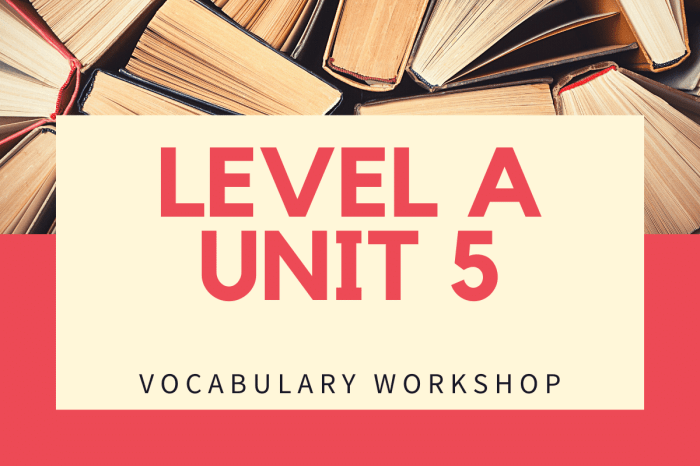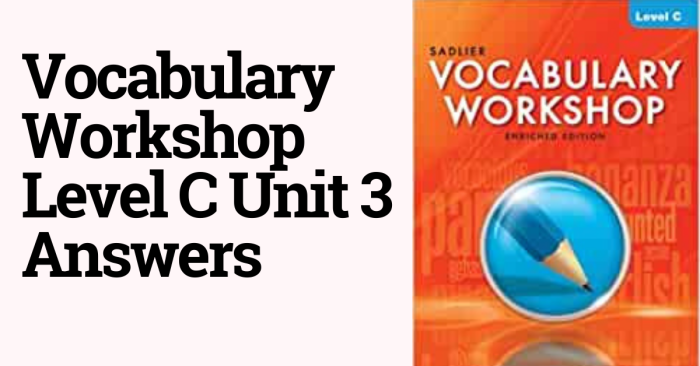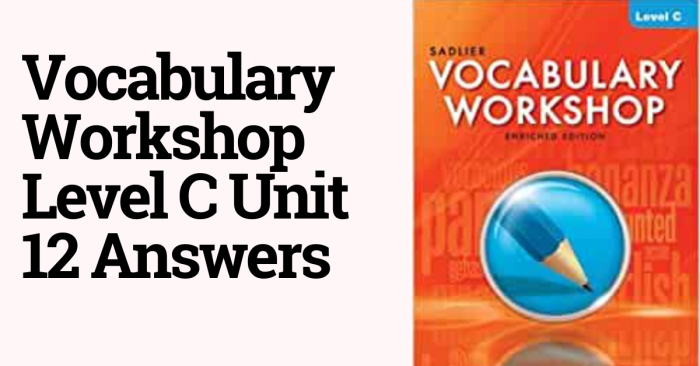Delving into Vocabulary Workshop Level A Unit 5 Answers, we embark on an exploration of strategies, activities, and assessment techniques that effectively enhance vocabulary development. Understanding the significance of vocabulary in language acquisition, this unit provides a comprehensive guide to fostering vocabulary growth, ensuring proficiency in various academic and professional contexts.
Throughout this discussion, we will delve into engaging activities that stimulate vocabulary acquisition, analyze the content and structure of Vocabulary Workshop Level A Unit 5, and identify key vocabulary words and concepts. Moreover, we will design a lesson plan that incorporates engaging activities and assessment strategies aligned with the unit’s objectives.
Vocabulary Development Activities
Vocabulary development is essential for language acquisition, as it enables learners to understand and express complex ideas. Engaging activities that foster vocabulary growth include:
- Games:Word games like Scrabble, Bananagrams, and Wordoku challenge learners to manipulate words and expand their vocabulary.
- Puzzles:Crosswords, anagrams, and word searches require learners to solve linguistic challenges, exposing them to new words and their meanings.
- Storytelling:Reading and discussing stories exposes learners to rich vocabulary in context, enhancing their understanding and retention.
Multimedia resources like videos and podcasts can also enrich vocabulary lessons by providing authentic language input and visual aids.
Vocabulary Assessment Techniques: Vocabulary Workshop Level A Unit 5 Answers
Effective vocabulary comprehension assessment methods include:
- Multiple-choice quizzes:Test learners’ recognition of word meanings by presenting multiple options.
- Fill-in-the-blank exercises:Assess learners’ ability to recall and use specific words in context.
- Sentence completion tasks:Evaluate learners’ understanding of word usage by asking them to complete sentences with appropriate words.
Each assessment format has advantages and disadvantages. Multiple-choice quizzes are easy to administer but may encourage guessing. Fill-in-the-blank exercises provide more precise data but can be time-consuming to grade. Sentence completion tasks assess both vocabulary and grammar.
To ensure reliability and validity, vocabulary assessments should:
- Cover a representative sample of vocabulary.
- Be clear and unambiguous in their instructions.
- Allow learners sufficient time to complete the assessment.
Strategies for Vocabulary Teaching

Effective vocabulary teaching strategies include:
- Explicit instruction:Explicitly teaching word meanings, pronunciations, and usage rules.
- Context-based learning:Introducing vocabulary in meaningful contexts, such as stories, articles, or videos.
- Spaced repetition:Regularly reviewing vocabulary to enhance long-term retention.
Technology can enhance vocabulary teaching through:
- Online games:Gamifying vocabulary learning with interactive exercises.
- Interactive exercises:Using apps and websites to provide personalized and engaging vocabulary practice.
Differentiated strategies are essential to meet the needs of diverse learners, such as:
- Visual learners:Using images, charts, and videos to illustrate vocabulary.
- Auditory learners:Incorporating audio recordings, podcasts, and songs into lessons.
- Kinesthetic learners:Engaging learners in physical activities, such as role-playing or games, to reinforce vocabulary.
Vocabulary Workshop Level A Unit 5
Vocabulary Workshop Level A Unit 5 focuses on:
- Key vocabulary words:Including “beautiful,” “celebrate,” “delicious,” “exciting,” and “favorite.”
- Concepts:Exploring themes of beauty, celebration, food, emotions, and preferences.
A lesson plan for Unit 5 could include:
- Introduction:Discussing the unit’s theme and key vocabulary words.
- Vocabulary games:Playing “Word Bingo” or “Vocabulary Charades” to practice word recognition.
- Context-based learning:Reading a short story or watching a video that incorporates the target vocabulary.
- Assessment:Administering a multiple-choice quiz to assess comprehension.
Applications of Vocabulary Development

Vocabulary development has practical applications in:
- Reading comprehension:Enhancing understanding of complex texts by expanding vocabulary.
- Writing fluency:Providing a wider range of words to express ideas effectively.
- Effective communication:Facilitating clear and precise communication in various contexts.
Strong vocabulary enhances overall language proficiency and success in:
- Academic settings:Comprehending textbooks, writing essays, and participating in class discussions.
- Professional environments:Communicating effectively in meetings, presentations, and written reports.
- Personal life:Expressing oneself clearly and engaging in meaningful conversations.
Key Questions Answered
What is the significance of vocabulary development in language acquisition?
Vocabulary development plays a crucial role in language acquisition, as it provides the building blocks for comprehension, expression, and communication. A strong vocabulary enables individuals to understand and convey complex ideas, enhancing their overall language proficiency.
What are some engaging activities that foster vocabulary growth?
Engaging activities that foster vocabulary growth include games like Scrabble or crossword puzzles, storytelling sessions, and incorporating multimedia resources such as videos and podcasts into vocabulary lessons. These activities make learning interactive and enjoyable, promoting vocabulary retention.
How can technology enhance vocabulary development?
Technology offers a range of tools and resources that can enhance vocabulary development. Online games, interactive exercises, and language learning apps provide engaging and personalized learning experiences, allowing learners to practice and expand their vocabulary at their own pace.
